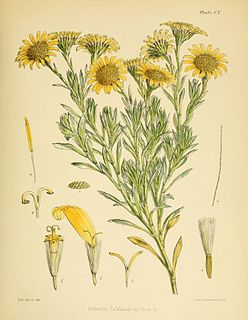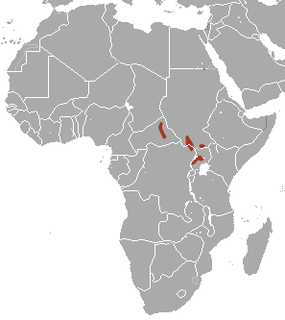
The lesser white-toothed shrew is a tiny shrew with a widespread distribution in Africa, Asia and Europe. Its preferred habitat is scrub and gardens and it feeds on insects, arachnids, worms, gastropods, newts and small rodents, though its diet usually varies according to the biotope where it lives. The closely related Asian lesser white-toothed shrew was once included in this species, but is now considered to be a separate species.

The lesser prairie chicken is a species in the grouse family.
The lesser long-fingered bat, also known as the black clinging bat or lesser bent-winged bat, is a species of vesper bat in the family Vespertilionidae.

Percival's spiny mouse is a species of rodent in the family Muridae. It is found in Kenya, Somalia, South Sudan, and Uganda. Its natural habitats are dry savanna, subtropical or tropical dry shrubland, and rocky areas. It is one of two known species of mammals, the other being Acomys kempi, capable of completely regenerating damaged tissue, including hair follicles, skin, sweat glands, fur and cartilage.

Goldman's woodrat is a rodent species in the family Cricetidae. It is found only in Mexico throughout the Mexican Plateau, stretching from Southeast Chihuahua to South San Luis Potosi and North Queretaro. The plateau is an average 5,988 ft. above sea level and covers a land area of 232,388 sq. miles.

Senecio littoralis, the woolly ragwort, is a species of flowering plant in the aster family. It is endemic to the Falkland Islands. Its natural habitats are temperate shrubland, rocky areas, and rocky shores. This species is threatened by habitat loss.
Senecio vaginatus, the smooth ragwort, is a species of flowering plant in the aster family. It is endemic to the Falkland Islands. Its natural habitats are temperate shrubland, rocky shores and other rocky areas. It is threatened by habitat loss.

Rhinella achalensis is a species of toad in the family Bufonidae that is endemic to northern Argentina.
Pleurodema bibroni is a species of frog in the family Leptodactylidae. Its common name is four-eyed frog, although this name can also refer to the genus Pleurodema in general. The common name refers to two inguinal poison glands that resemble eyes. When threatened, the frog lowers its head and raises its rear. When the frog adopts this posture the poison glands are also raised toward the predator. The predator may also confuse the frog's raised posterior for the head of a larger animal.

The Makwassie musk shrew is a species of mammal in the family Soricidae. It is found in South Africa, Eswatini, and Zimbabwe. Its natural habitat is rocky areas.

The Saharan shrew is a species of mammal in the family Soricidae. It is found in Mauritania and Morocco. Its natural habitats are rocky areas and sandy shores. It is threatened by habitat loss.

The Cretan shrew is a species of mammal in the family Soricidae. It is endemic and exclusive to the island of Crete, Greece. Its natural habitat is temperate shrubland, and the animal is threatened by habitat loss. It is found in the mountainous highlands of Crete, having been displaced from lower altitudes by the lesser white-toothed shrew.

The smoky bat is a species of bat in the family Furipteridae. It is monotypic within the genus Amorphochilus. Its natural habitat is rocky shores. It is threatened by habitat loss. This bat is also called the thumbless bat because its thumb is partly enclosed in its wing; this common name is also applied to another species, Furipterus horrens. This species lives in western Peru, western Ecuador, Puna island (Ecuador) and northern Chile. These bats can be found in groups up to 300 bats. In 2013, Bat Conservation International listed this species as one of the 35 species of its worldwide priority list of conservation. The Smoky Bat is known to be exclusive to neotropical distribution, especially in Central American regions. It is also known that they do not leave their habitat until very dark out. The Smoky Bat also insectivores animals that like to fly very close to the ground to catch their prey. They also like to live in areas that are very hidden, such as small crevices (Duda, R., Dalapicolla, J., & Costa, L. P..

The Bunyoro rabbit or Central African rabbit is a species of mammal in the family Leporidae. It is monotypic within the genus Poelagus. It is found in central Africa and its typical habitat is damp savannah, often with rocky outcrops.

Nassauvia serpens, the snakeplant, is a species of plant in the family Asteraceae. It is endemic to the Falkland Islands. Its natural habitats are temperate shrublands, and rocky areas. Although assessed as Least Concern, it is experiencing continued habitat loss.
Vepris suaveolens, synonym Oricia suaveolens, is a species of plant in the family Rutaceae. It is found in Cameroon, the Central African Republic, the Democratic Republic of the Congo, Ivory Coast, Ghana, Guinea, Liberia, Nigeria, and Sierra Leone. It is threatened by habitat loss.

The jackass shrew is a species of mammal belonging to the Soricidae family. It is endemic to Turkey. Its natural habitat is in rocky areas.













